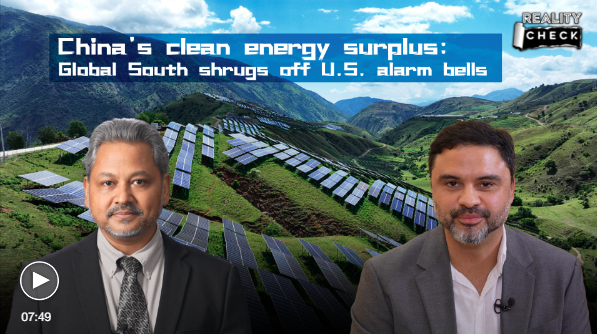LATEST INSIGHTS
Your Present Location: LATEST INSIGHTSMarco Fernandes: China's clean energy surplus: Global South shrugs off U.S. alarm bells
Source: CGTN Published: 2024-04-06

Editor's note: Ahead of her visit to China, U.S. Treasury Secretary Janet Yellen raised the bogey of China's 'overcapacity' in the clean energy industries, citing potential repercussions for the United States and its allies. However, this raises questions about the global balance of power in clean energy technology. What do nations in the Global South think and do they have a say in shaping the adoption of more affordable and accessible clean energy solutions? To delve into these pressing questions, CGTN's Sr. International Editor Abhishek G. Bhaya spoke with Marco Fernandes, a research fellow at the Tricontinental Institute for Social Research, Brazil, during an event at Renmin University of China in Beijing. The views expressed in the video are his own and not necessarily those of CGTN.
In the global discourse on clean energy, a clash of interests between economic giants often dominates headlines. Recently, the United States, through Treasury Secretary Janet Yellen, sounded the alarm on what it perceives as China's 'overcapacity' in the clean energy sector. However, amidst these diplomatic tremors, the Global South maintains a pragmatic stance, viewing China's surplus as an opportunity rather than a threat to their interests.
Brazilian researcher Marco Fernandes highlighted the geopolitical undercurrents driving the narrative surrounding China's expanding presence in the clean energy market. He emphasized how Western powers, including the U.S. and its allies, perceive China as a formidable challenger to their dominance. 'It's a clear geopolitical game,' Fernandes remarked. 'The United States, European countries, the G7, the NATO, the collective West, of course, they see China as a threat to their hegemony, to their domination.'
Yet, for countries in the Global South such as Brazil, China's surplus represents a potential avenue for growth and development. Fernandes underscored the strategic significance of having a major economic player like China actively engaging with the Global South. 'It's the first time that we have a major economy, such a strong economy in the realm of the Global South, so it's absolutely strategic,' Fernandes noted.
Central to the discussion was the notion of 'overcapacity' and its implications for the global market. Fernandes debunked the notion that China's subsidies for its clean energy industries constitute unfair practices, citing examples of similar strategies employed by Western governments in other sectors.
'Actually, what they mean by overcapacity... it's true that they say that 'Oh, in China state is subsidizing these companies.' Yes, it is. Just like the U.S. government subsidizes its companies and like the European Union heavily subsidizes the agricultural sector, and protects it from other countries like Brazil,' Fernandes elucidated.
'Brazil cannot export to Europe lots of products because it's protected. So, this is part of the game. This is how the global market works and how competition in the global market works. But looks like when China does 'Oh, it's bad. Oh, it's cheating?',' he added.
Moreover, Fernandes shed light on the role of innovation in China's ascendancy in the clean energy sector. 'There's also the issue of innovation,' Fernandes remarked. 'China was able, in the last years, to have a huge leap in innovation, both in electric vehicles, in solar panels, in renewable energies, wind turbines, etc.'
Crucially, Fernandes advocated for balanced partnerships that benefit all stakeholders involved. 'It's a matter of trying to have balanced partnerships,' Fernandes emphasized. 'Maybe now it's time for Brazilian companies to team up with Chinese companies, for instance, to produce electric vehicles or solar panels in Brazil.'
It's important to acknowledge that China's policy and investments in renewable energy have propelled the world towards a more sustainable future. The production of solar panels and electric vehicles at a large scale has significantly contributed to lowering costs and making green technology more accessible globally. Cheaper Chinese goods in these sectors have accelerated the adoption of clean energy solutions, providing affordable options for developing countries, particularly those in the Global South.
Fernandes cited China's robust relations with Latin America and particularly Brazil's record trade surplus as additional evidence of Beijing's mutually beneficial partnerships with the countries of the Global South. 'Latin America has had a substantial partnership with China for at least the last 20 years. Brazil, for instance, has more thana $100 billion in trade and actually a $50-billion surplus with China, which is very rare. Usually, countries have deficits with China, but Brazil, because of the soy, oil and iron ore [exports], has very good trade relations and is very beneficial.'
As the debate unfolds, it is essential to recognize the broader implications of the China-U.S. tensions on the Global South. Fernandes cautioned against the notion of aligning with one side over the other, stressing the importance of maintaining sovereignty and making decisions that serve the best interests of each country.
'The U.S. has this behavior – although they deny it – but it's as if you have to pick one of the sides,' Fernandes observed. 'Brazil is a huge country. It's now the ninth-biggest economy in the world. We don't have to pick sides. We have to do what is best for the country… It has to maintain its own sovereignty and make decisions in Brasilia, and not in Washington, neither in Beijing,' he added.
In conclusion, as Secretary Yellen visits China, the implications of the strained China-U.S. relationship resonate far beyond their borders. The Global South, in particular, finds itself at a crossroads, navigating the repercussions of this geopolitical friction. While the rhetoric surrounding issues like China's alleged overcapacity in clean energy industries persists, it's crucial to recognize the broader context at play.
Key Words: Marco Fernandes, Clean energy, Global South























































































 京公网安备 11010802037854号
京公网安备 11010802037854号





